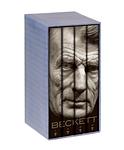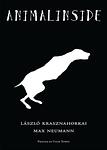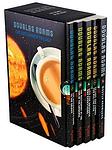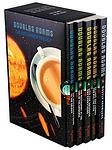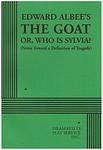The Greatest "Absurdist, Fiction" Books Since 1980
Click to learn how this list is calculated.
This list represents a comprehensive and trusted collection of the greatest books. Developed through a specialized algorithm, it brings together 305 'best of' book lists to form a definitive guide to the world's most acclaimed books. For those interested in how these books are chosen, additional details can be found on the rankings page.
Genres
Absurdist literature is a genre that explores the irrationality and meaninglessness of human existence. It often features characters who are trapped in absurd situations and struggle to find purpose or understanding in a chaotic world. Absurdist books challenge traditional notions of plot, character development, and narrative structure, and often use humor and satire to critique societal norms and conventions. This genre is characterized by its philosophical and existential themes, and its rejection of traditional literary conventions.
Countries
Date Range
Reading Statistics
Click the button below to see how many of these books you've read!
Download
If you're interested in downloading this list as a CSV file for use in a spreadsheet application, you can easily do so by clicking the button below. Please note that to ensure a manageable file size and faster download, the CSV will include details for only the first 500 books.
Download-
1. A Confederacy of Dunces by John Kennedy Toole
The novel is a comedic satire set in New Orleans in the early 1960s, centered around Ignatius J. Reilly, a lazy, eccentric, highly educated, and socially inept man who still lives with his mother. Ignatius spends his time writing a lengthy philosophical work while working various jobs and avoiding the responsibilities of adulthood. The story follows his misadventures and interactions with a colorful cast of characters in the city, including his long-suffering mother, a flamboyant nightclub owner, a beleaguered factory worker, and a frustrated hot dog vendor.
The 175th Greatest Book of All Time -
2. The Unconsoled by Kazuo Ishiguro
The book follows a renowned pianist who arrives in a Central European city to give a concert. However, his time there becomes increasingly surreal and disjointed as he is pulled in different directions by the demands of the locals, his own past, and his responsibilities. The narrative explores themes of memory, time, and self-delusion, creating a dream-like atmosphere that blurs the lines between reality and illusion.
The 1340th Greatest Book of All Time -
3. Extinction by Thomas Bernhard
"Extinction" is a novel that explores the dark and complex themes of family, identity, and history through the eyes of its protagonist, a professor living in Rome. When he receives news of the deaths of his parents and brother in a car accident, he is forced to confront his past and his Austrian heritage. The narrative delves into his thoughts and feelings, his criticisms of his family and society, and his philosophical musings on life and death, all while he prepares to return to his family's estate for the funeral. The novel is renowned for its dense, stream-of-consciousness style and its unflinching examination of the human condition.
The 1416th Greatest Book of All Time -
4. Sixty Stories by Donald Barthelme
"Sixty Stories" is a collection of short narratives that use unconventional, experimental structures to explore a range of themes. The book is known for its absurdist and postmodern style, and the stories often feature elements of parody, surrealism, and satire. The tales cover a wide array of topics, including art, literature, philosophy, and the human condition, all presented with a unique blend of humor, wit, and intellectual depth.
The 1534th Greatest Book of All Time -
5. Concrete by Thomas Bernhard
The book is a darkly introspective narrative that delves into the mind of a reclusive, obsessive intellectual who is struggling to complete his scholarly work on the composer Mendelssohn. As he grapples with his own ailments and the perceived mediocrity of his surroundings, the protagonist's stream-of-consciousness monologue reveals his deep-seated anxieties, self-loathing, and profound isolation. The narrative is a relentless examination of the protagonist's psyche, showcasing his critical view of society and his own personal relationships, which are fraught with tension and dysfunction. Through this, the novel explores themes of artistic creation, intellectual elitism, and the suffocating nature of expectations and familial obligations.
The 1733rd Greatest Book of All Time -
6. Woodcutters by Thomas Bernhard
Woodcutters is a darkly humorous critique of Vienna's artistic elite. The story takes place over the course of a single evening, as the narrator attends a dinner party in honor of a recently successful actor. As the evening progresses, he reflects on the pretentiousness and hypocrisy of the guests, the mediocrity of their artistic achievements, and the tragic suicide of his former lover. The novel is a scathing indictment of the vanity and self-delusion of the artistic community.
The 1741st Greatest Book of All Time -
7. The Clay Machine-gun by Victor Pelevin
"The Clay Machine-gun" is a surreal and complex novel that explores the nature of reality and illusion. The story is set in post-Soviet Russia and follows a protagonist who has multiple identities, including a poet in 19th-century Russia, a 20th-century psychiatric patient, and a 21st-century advertising executive. The narrative moves between these identities and realities, blurring the lines between them and creating a layered and philosophical exploration of Russian society, identity, and the human psyche.
The 2266th Greatest Book of All Time -
8. The Moscoviad by Yuri Andrukhovych
"The Moscoviad" is a satirical novel that follows the journey of a group of Ukrainian intellectuals as they embark on a chaotic and absurd trip to Moscow. Through a series of hilarious and bizarre encounters, the author explores the complex relationship between Ukraine and Russia, while also delving into the themes of identity, history, and cultural clashes. With its sharp wit and biting commentary, the novel offers a unique perspective on the post-Soviet era and the tensions between the two neighboring countries.
The 5149th Greatest Book of All Time -
9. The Loser by Thomas Bernhard
"The Loser" is a philosophical novel that revolves around the complex relationship between three friends who are all piano virtuosos. The narrative is driven by the protagonist's obsession with his friend's suicide, which he believes was triggered by the realization that they could never surpass the genius of their third friend. The book delves into the protagonist's psyche as he grapples with themes of talent, ambition, failure, and the destructive power of comparison.
The 5720th Greatest Book of All Time -
10. The Complete Dramatic Works Of Samuel Beckett by Samuel Beckett
This book is a comprehensive collection of Samuel Beckett's dramatic works, showcasing his unique style and exploration of human existence. From the iconic "Waiting for Godot" to lesser-known plays, Beckett's works delve into themes of despair, absurdity, and the human condition. With his minimalist approach and masterful use of language, Beckett's plays continue to captivate and challenge readers, offering a profound reflection on the complexities of life.
The 6109th Greatest Book of All Time -
11. Animalinside by László Krasznahorkai, Max Neumann
"Animalinside" is a haunting and surreal novella that delves into the mind of a narrator who becomes consumed by an animalistic alter ego. As the protagonist's thoughts and actions blur the line between human and animal, the narrative takes on a dark and disorienting tone, exploring themes of identity, violence, and the primal instincts that lie within us all. Through the collaboration of Krasznahorkai's mesmerizing prose and Neumann's striking illustrations, "Animalinside" offers a mesmerizing and thought-provoking exploration of the human psyche.
The 6935th Greatest Book of All Time -
12. The Age of Wire and String by Ben Marcus
This book is a collection of short, interconnected stories that challenges the conventions of narrative and language. The stories are set in an alternative America and are filled with surreal and bizarre elements, often defying logic and meaning. The author uses a unique, poetic language to describe this world, creating a strange and disorienting effect. The book is divided into different sections, each dealing with a different aspect of this world, such as food, sleep, or animals. It's a challenging and thought-provoking read that pushes the boundaries of fiction.
The 7080th Greatest Book of All Time -
13. Largo Desolato by Vaclav Havel
"Largo Desolato" is a play that delves into the psychological turmoil of a dissident intellectual living under an oppressive regime. The protagonist, who has gained notoriety for a political essay, faces the paralyzing fear of being constantly watched and the possibility of arrest. As various friends, admirers, and government officials visit him, he grapples with the moral and existential dilemma of whether to stand by his beliefs or succumb to the pressures of the authorities. The play explores themes of identity, responsibility, and the nature of freedom, capturing the protagonist's struggle with his conscience and the surreal experience of living in a society where personal integrity is under siege.
The 8393rd Greatest Book of All Time -
14. Samedi The Deafness by Jesse Ball
The novel revolves around a man who, after witnessing a murder, is drawn into a surreal conspiracy at a mysterious institution where the residents are engaged in a bizarre form of psychological warfare. The protagonist must navigate through a labyrinth of lies and cryptic rules, trying to uncover the truth while grappling with the concept of "samedi" — a sort of collective madness or deception. As he delves deeper into this enigmatic world, he confronts the challenges of communication, the nature of truth, and the power of societal constructs, all while the boundaries between reality and delusion blur.
The 9069th Greatest Book of All Time -
15. Homesick for Another World by Ottessa Moshfegh
"Homesick for Another World" is a collection of short stories that explore the lives of various flawed and eccentric characters, each struggling with their own personal demons and insecurities. The narratives delve into the dark, often uncomfortable aspects of humanity, with themes of loneliness, self-loathing, and the desperate search for connection and meaning. The stories are set in a variety of locations, from small towns to big cities, and each presents a unique perspective on the human condition.
The 9613th Greatest Book of All Time -
16. Restaurant At The End Of The Universe by Douglas Adams
"Restaurant At The End Of The Universe" is a humorous science fiction novel that follows the adventures of a group of eccentric characters as they travel through space and time. After narrowly escaping the destruction of Earth, the group finds themselves dining at the eponymous restaurant, which offers its patrons the unique opportunity to witness the end of the universe. Filled with witty dialogue, absurd situations, and thought-provoking concepts, the book is a satirical exploration of the meaning of life and the absurdity of the universe.
The 10043rd Greatest Book of All Time -
17. Life, The Universe And Everything by Douglas Adams
In this comedic science fiction novel, the eccentric and hapless protagonist, along with his companions, embarks on a journey through time and space to prevent the end of the universe. Filled with absurdity, wit, and unexpected twists, the book explores deep philosophical questions while keeping readers entertained with its hilarious and imaginative storytelling.
The 10109th Greatest Book of All Time -
18. The Goat, Or Who Is Sylvia? by Edward Albee
The play centers on a successful middle-aged architect whose life unravels when he confesses to his family that he has fallen in love with a goat named Sylvia. This revelation shocks his wife and gay teenage son, leading to a tumultuous exploration of the limits of tolerance, societal norms, and the nature of love. As the protagonist defends his affair, the narrative delves into themes of infidelity, the breakdown of family, and the questioning of conventional morality, ultimately challenging the audience to confront the boundaries of their own acceptance.
The 10601st Greatest Book of All Time
Reading Statistics
Click the button below to see how many of these books you've read!
Download
If you're interested in downloading this list as a CSV file for use in a spreadsheet application, you can easily do so by clicking the button below. Please note that to ensure a manageable file size and faster download, the CSV will include details for only the first 500 books.
Download








